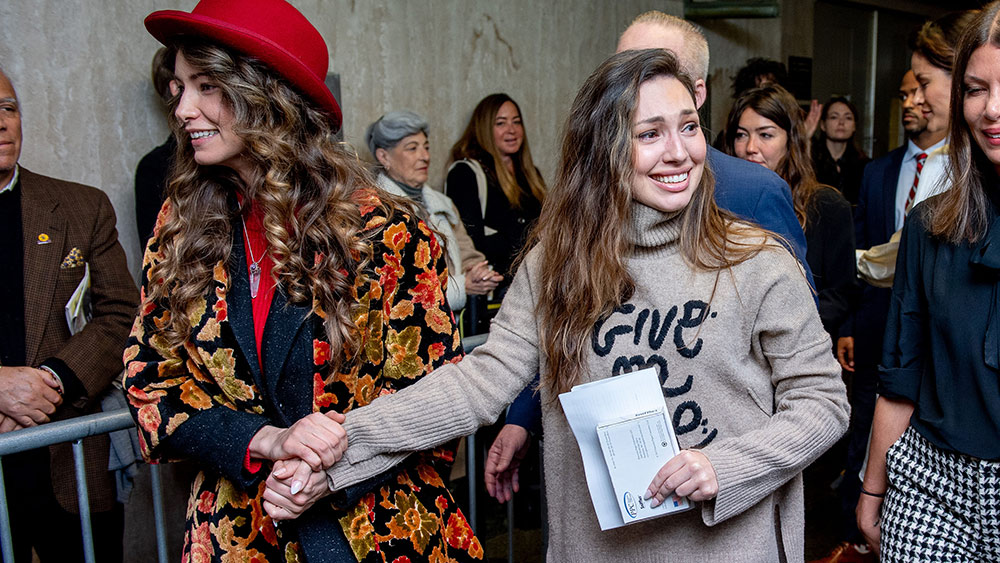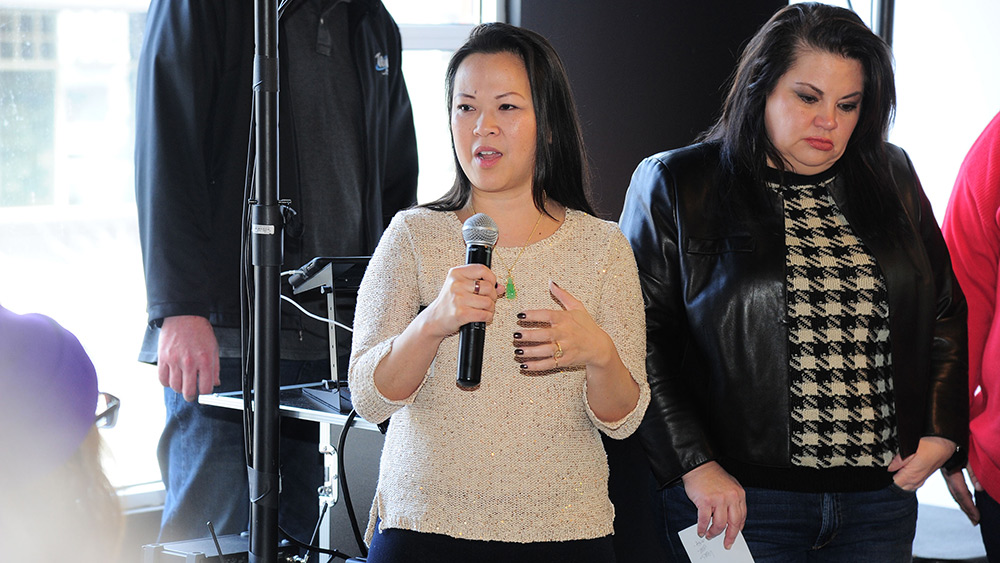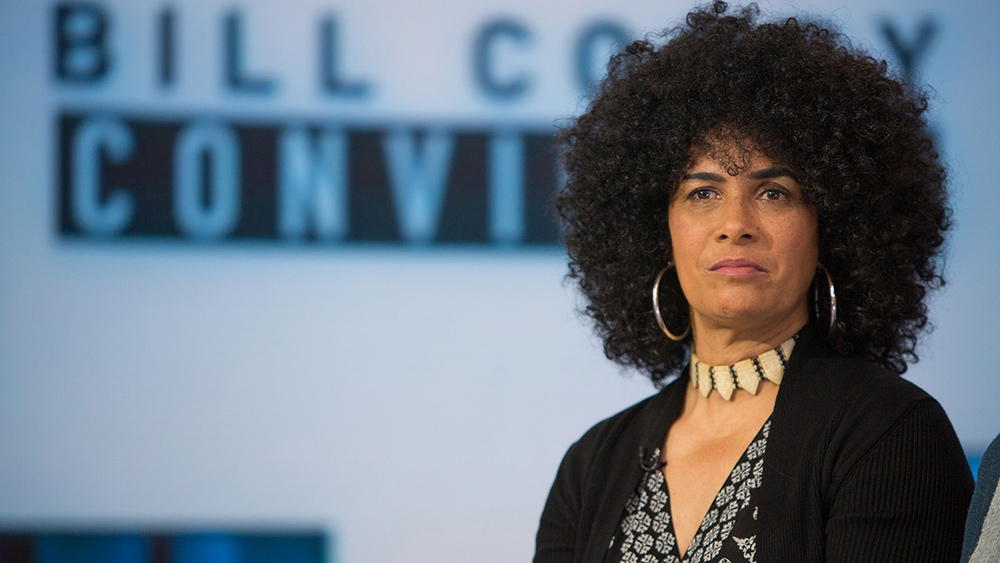哈维·韦恩斯坦被判23年监禁的消息传出时,莉莉·伯纳德正在前往参加Echo Training会议的路上。Echo Training组织由韦恩斯坦性侵案的众多受害者之一路易丝·戈德博尔德领导,旨在为遭受过创伤的人们赋予力量。莉莉本人也是老牌谐星比尔·科斯比性侵案的受害者,在得知了对于韦恩斯坦的判决后,她难掩自己的喜悦之情。
她在接受《财富》采访时说:“我一边开车一边尖叫!是真的尖叫!我得在会议上朗读马娅·安杰卢的诗《我仍将奋起》(Still I Rise)。我说的第一句话是:‘祝贺那些受过韦恩斯坦伤害并幸存下来的姐妹们。’她们成了我的朋友,我们因为有过共同的遭遇而情同手足,这种感觉非常奇妙。他被判了23年,这不仅仅证明了她们的清白而已。就像我在科斯比被定罪时说的一样,这也是人类迈出的一大步,因为人们终于相信了女性的声音:我们很重要,我们值得尊重。”
尽管韦恩斯坦很可能要在监狱里度过余生,但活动人士指出,娱乐行业还有很长的路要走,才能使其成为一个对弱势群体而言更安全、更公平的地方,不论他们是女演员、制片助理还是前台接待。好莱坞已经发生了诸多变化,有了“时间到了”(Time’s Up)、“女性电影人”(Women in Film,简称WIF)等组织的努力,以及大批像莉莉这样的受害者化悲愤为力量,娱乐行业还将迎来更多变革。

正如《女性与好莱坞》(Women and Hollywood)创始人兼出版人梅利莎·西尔弗斯坦所说:“当前的进步是由许多人争取而来的,他们受到了很大很大的伤害,希望这些代价都是值得的。我们应该不断努力进步,向他们致敬。”
如今韦恩斯坦罪名成立,好莱坞和整个娱乐业会发生怎样的变化呢?没有人可以肯定,但许多人乐观地认为这一刻代表了新的转折点。
会有更多的受害者打破沉默
一些活动人士认为,韦恩斯坦锒铛入狱后,最明显、也最直接的影响是会有更多的受害者勇于打破沉默,并有可能提出起诉。受害者可以看到,强奸犯将会得到应有的惩罚,而不是像布罗克·特纳之流被从轻发落。这名斯坦福大学的游泳健将因被控强奸香奈儿·米勒而被判6个月监禁,但服刑3个月即被释放出狱。香奈儿于是写了一本书,讲述自己的痛苦遭遇和走出阴影的过程。
“时间到了”运动娱乐部执行董事阮玉(音,Ngoc Nguyen)表示:“这是一盏明灯,它将指引其他许多幸存者。他们回过头来会说:‘真相确实很重要,正义得到了伸张。’现在他们有了寻找正义的方向。”
“女性电影人”(WIF)执行董事柯尔丝滕·谢弗表示,该组织设立的求助热线855-WIF-LINE发现,拨打电话寻求帮助的人数有所增加。有的是为了寻求免费法律援助,有的则是为了寻找心理咨询。“时间到了”的法律保护基金会也开设了求助热线202-319-3053,旨在帮助受害者获得法律咨询,并在求助者提出申请后让他们获得公关支持。
推行落实更合理的工作场所政策
在梅利莎看来,最近一系列备受瞩目的案件可以带来许多好处,比如更多的女演员会团结起来,共同探讨她们面临的各种问题。她指出:“她们被蓄意孤立了很长时间。在这个行业里,人们不会每天都去办公室上班。所以她们聚到一起后,就了解了更多内幕,比如‘我拿这点工资,他拿那点工资。’”
由于缺乏传统的工作环境,员工往往无法得到人事方面的协助。柯尔丝滕说:“最近几个月里,人们针对那些没有完整人事部门的制片方和制片公司发起了一场运动。美国制片人协会(Producers Guild)发起活动,专门为独立项目参与者和打零工的合同工提供培训。我们需要不断努力,确保这些人有发声的渠道。所以我们开通了求助热线,我们知道很多女性不愿向人事部门求助,或者她们公司没有人事部门。”
片场、影棚、电影节的权力结构多元化
阮玉指出:“‘时间到了’运动绝不是为了打倒某一个人,而是为了抓住问题本质,加快制度变革。”
因此,韦恩斯坦的判决象征着我们摆脱了白人高管的肆意欺压,同时也表明了他当初倚靠的权力结构需要进一步做出调整。阮玉表示:“它旨在审视我们将怎样改变高管晋升的模式,以及我们是怎样更换那些肩负要职的把关者的。比如我们发起了‘百分之四挑战’(4 Percent Challenge),从而增加各个项目委任的女性导演人数。许多主要影视公司和电视网都主动表示:‘我们同意将在未来18个月里与一位女性导演合作。’”

但仅仅增加女性导演是不够的。“时间到了”日前与南加州大学Annenberg新闻与传播学院合作开展了一项名为“电影节包容性”(Inclusion at Film Festivals)的调查。结果表明,电影节委员会的成员越多元,一些代表性不足的影片就越有可能在电影节上放映。他们也在努力提高影评人和记者的多元性,并启动了名为“Who's in the Room”的指导项目,帮助那些希望从事策划和制片工作的女性。阮玉说:“我们关心的是整个生态系统。”
“女性电影人”组织也推出了简单而有效的措施,在整个电影制片过程中促进性别平等,寻求真正意义上的认可。柯尔丝滕说:“我们与圣丹斯协会(Sundance Institute)开展了一个叫做ReFrame的项目,专门为做到性别平衡的影视节目盖章。已经有不少人打电话来咨询说,‘我要进入制作阶段了,我想得到ReFrame的盖章。你能不能看一下我们的演职人员名单,给我们盖个章?’这个项目也引起了公众的注意,就像人们想买经过认证的有机食品一样,他们也希望观看那些得到ReFrame盖章的内容。”
出台保护女演员和儿童的新规
现在我们会安排“床戏指导”在现场协调裸露和性爱镜头的拍摄,也会确保女演员知晓自己权利,让她们在片场或试镜时拒绝拍摄裸体镜头。我们在以上两个方面已经取得了长足的进步。作为演员工会-美国电视和广播艺人联合会(SAG-AFTRA)反对性骚扰委员会的成员,莉莉也在与罗珊娜·阿奎特、詹妮弗·比尔斯、米拉·索维诺、埃利奥特·古尔德、泰瑞·克鲁斯、科里·费尔德曼等演员合作,保护女演员的权益。而要将这些保护措施制定成法律,整个过程让莉莉大开眼界。她在1984年客串出演科斯比的情景喜剧时认识了这位谐星,后遭到了他的性侵。
她说:“我们正在试着修改一些法律,比如有关选角导演可以要求女演员脱掉上衣的规定。”她清楚地记得,联合会集体谈判协议中有一项条文尤其令人困惑。其中写道:“制片人也有权在拍摄裸体场景(非性爱场景)时,为年龄较小的儿童(幼儿)使用替身。”
莉莉说:“当时我给“时间到了”组织的玛拉·纳萨提尔(Mara Nasatir)发短信问:‘这是什么意思?’她回复说:‘这一般是指4岁以下的儿童。’我一下子就懵了。演员工会的指导手册上居然说5岁的孩子可以拍裸体场景?现在的司法系统正在适应现代文化,而我们也在努力帮助演员工会适应司法系统。”
让更多的旁观者挺身而出
盟友将在保护弱势群体方面发挥关键作用。在莉莉看来,凡是目睹了犯罪、骚扰、霸凌行为的人都会有更大的勇气挺身而出,为受害者发声。她回忆科斯比曾经威胁说,要是自己敢站出来,他就会以诬告罪和诽谤罪起诉她。所以她完全能想像,要是某个制片助理报告说看见他往别人的饮料里下药,科斯比会对这个助理发出怎样的威胁。

她说:“旁观者文化也需要有所改变,才能让强奸文化被公正判决。很多人保持沉默,因为他们想保住自己的工作。每个人都要维持生计、养活孩子,还要支付房租或偿还贷款。他们是知情人,但是出于恐惧他们只能保持沉默。现在这些旁观者目睹了不公正的事件后,会更有勇气站出来发声。”
雇佣被列入黑名单的女性
正如柯尔丝滕所说,对韦恩斯坦的判决和量刑并不会消除他给许多职业女性造成的痛苦和伤害。她表示:“人们绝对在讨论这个问题:这些女性被侵害后,特别是那些站出来发声的女性,她们的职业生涯和生活发生了什么变化?谁雇佣了她们?即使侵害者已经定罪,她们发声后有没有被污名化?我们需要共同努力,让雇主考虑雇佣她们。”
莉莉对此表示赞同,她说科斯比对她事业造成的伤害并没有因为他锒铛入狱就轻易愈合。人们不应该对所谓“难对付的”女演员抱有偏见。她表示:“我说我要向警方举报他,他就威胁要把我列入黑名单。他还说,‘我会告诉好莱坞的所有人,你是个差劲的演员,你是个骗子,你是个小贱人,想要靠潜规则一步步往上爬。’所以现在我代表了那些因为遭到性侵而毁掉了事业的演员们。”(财富中文网)
译者:智竑
哈维·韦恩斯坦被判23年监禁的消息传出时,莉莉·伯纳德正在前往参加Echo Training会议的路上。Echo Training组织由韦恩斯坦性侵案的众多受害者之一路易丝·戈德博尔德领导,旨在为遭受过创伤的人们赋予力量。莉莉本人也是老牌谐星比尔·科斯比性侵案的受害者,在得知了对于韦恩斯坦的判决后,她难掩自己的喜悦之情。
她在接受《财富》采访时说:“我一边开车一边尖叫!是真的尖叫!我得在会议上朗读马娅·安杰卢的诗《我仍将奋起》(Still I Rise)。我说的第一句话是:‘祝贺那些受过韦恩斯坦伤害并幸存下来的姐妹们。’她们成了我的朋友,我们因为有过共同的遭遇而情同手足,这种感觉非常奇妙。他被判了23年,这不仅仅证明了她们的清白而已。就像我在科斯比被定罪时说的一样,这也是人类迈出的一大步,因为人们终于相信了女性的声音:我们很重要,我们值得尊重。”
尽管韦恩斯坦很可能要在监狱里度过余生,但活动人士指出,娱乐行业还有很长的路要走,才能使其成为一个对弱势群体而言更安全、更公平的地方,不论他们是女演员、制片助理还是前台接待。好莱坞已经发生了诸多变化,有了“时间到了”(Time’s Up)、“女性电影人”(Women in Film,简称WIF)等组织的努力,以及大批像莉莉这样的受害者化悲愤为力量,娱乐行业还将迎来更多变革。
正如《女性与好莱坞》(Women and Hollywood)创始人兼出版人梅利莎·西尔弗斯坦所说:“当前的进步是由许多人争取而来的,他们受到了很大很大的伤害,希望这些代价都是值得的。我们应该不断努力进步,向他们致敬。”
如今韦恩斯坦罪名成立,好莱坞和整个娱乐业会发生怎样的变化呢?没有人可以肯定,但许多人乐观地认为这一刻代表了新的转折点。
会有更多的受害者打破沉默
一些活动人士认为,韦恩斯坦锒铛入狱后,最明显、也最直接的影响是会有更多的受害者勇于打破沉默,并有可能提出起诉。受害者可以看到,强奸犯将会得到应有的惩罚,而不是像布罗克·特纳之流被从轻发落。这名斯坦福大学的游泳健将因被控强奸香奈儿·米勒而被判6个月监禁,但服刑3个月即被释放出狱。香奈儿于是写了一本书,讲述自己的痛苦遭遇和走出阴影的过程。
“时间到了”运动娱乐部执行董事阮玉(音,Ngoc Nguyen)表示:“这是一盏明灯,它将指引其他许多幸存者。他们回过头来会说:‘真相确实很重要,正义得到了伸张。’现在他们有了寻找正义的方向。”
“女性电影人”(WIF)执行董事柯尔丝滕·谢弗表示,该组织设立的求助热线855-WIF-LINE发现,拨打电话寻求帮助的人数有所增加。有的是为了寻求免费法律援助,有的则是为了寻找心理咨询。“时间到了”的法律保护基金会也开设了求助热线202-319-3053,旨在帮助受害者获得法律咨询,并在求助者提出申请后让他们获得公关支持。
推行落实更合理的工作场所政策
在梅利莎看来,最近一系列备受瞩目的案件可以带来许多好处,比如更多的女演员会团结起来,共同探讨她们面临的各种问题。她指出:“她们被蓄意孤立了很长时间。在这个行业里,人们不会每天都去办公室上班。所以她们聚到一起后,就了解了更多内幕,比如‘我拿这点工资,他拿那点工资。’”
由于缺乏传统的工作环境,员工往往无法得到人事方面的协助。柯尔丝滕说:“最近几个月里,人们针对那些没有完整人事部门的制片方和制片公司发起了一场运动。美国制片人协会(Producers Guild)发起活动,专门为独立项目参与者和打零工的合同工提供培训。我们需要不断努力,确保这些人有发声的渠道。所以我们开通了求助热线,我们知道很多女性不愿向人事部门求助,或者她们公司没有人事部门。”
片场、影棚、电影节的权力结构多元化
阮玉指出:“‘时间到了’运动绝不是为了打倒某一个人,而是为了抓住问题本质,加快制度变革。”
因此,韦恩斯坦的判决象征着我们摆脱了白人高管的肆意欺压,同时也表明了他当初倚靠的权力结构需要进一步做出调整。阮玉表示:“它旨在审视我们将怎样改变高管晋升的模式,以及我们是怎样更换那些肩负要职的把关者的。比如我们发起了‘百分之四挑战’(4 Percent Challenge),从而增加各个项目委任的女性导演人数。许多主要影视公司和电视网都主动表示:‘我们同意将在未来18个月里与一位女性导演合作。’”
但仅仅增加女性导演是不够的。“时间到了”日前与南加州大学Annenberg新闻与传播学院合作开展了一项名为“电影节包容性”(Inclusion at Film Festivals)的调查。结果表明,电影节委员会的成员越多元,一些代表性不足的影片就越有可能在电影节上放映。他们也在努力提高影评人和记者的多元性,并启动了名为“Who's in the Room”的指导项目,帮助那些希望从事策划和制片工作的女性。阮玉说:“我们关心的是整个生态系统。”
“女性电影人”组织也推出了简单而有效的措施,在整个电影制片过程中促进性别平等,寻求真正意义上的认可。柯尔丝滕说:“我们与圣丹斯协会(Sundance Institute)开展了一个叫做ReFrame的项目,专门为做到性别平衡的影视节目盖章。已经有不少人打电话来咨询说,‘我要进入制作阶段了,我想得到ReFrame的盖章。你能不能看一下我们的演职人员名单,给我们盖个章?’这个项目也引起了公众的注意,就像人们想买经过认证的有机食品一样,他们也希望观看那些得到ReFrame盖章的内容。”
出台保护女演员和儿童的新规
现在我们会安排“床戏指导”在现场协调裸露和性爱镜头的拍摄,也会确保女演员知晓自己权利,让她们在片场或试镜时拒绝拍摄裸体镜头。我们在以上两个方面已经取得了长足的进步。作为演员工会-美国电视和广播艺人联合会(SAG-AFTRA)反对性骚扰委员会的成员,莉莉也在与罗珊娜·阿奎特、詹妮弗·比尔斯、米拉·索维诺、埃利奥特·古尔德、泰瑞·克鲁斯、科里·费尔德曼等演员合作,保护女演员的权益。而要将这些保护措施制定成法律,整个过程让莉莉大开眼界。她在1984年客串出演科斯比的情景喜剧时认识了这位谐星,后遭到了他的性侵。
她说:“我们正在试着修改一些法律,比如有关选角导演可以要求女演员脱掉上衣的规定。”她清楚地记得,联合会集体谈判协议中有一项条文尤其令人困惑。其中写道:“制片人也有权在拍摄裸体场景(非性爱场景)时,为年龄较小的儿童(幼儿)使用替身。”
莉莉说:“当时我给“时间到了”组织的玛拉·纳萨提尔(Mara Nasatir)发短信问:‘这是什么意思?’她回复说:‘这一般是指4岁以下的儿童。’我一下子就懵了。演员工会的指导手册上居然说5岁的孩子可以拍裸体场景?现在的司法系统正在适应现代文化,而我们也在努力帮助演员工会适应司法系统。”
让更多的旁观者挺身而出
盟友将在保护弱势群体方面发挥关键作用。在莉莉看来,凡是目睹了犯罪、骚扰、霸凌行为的人都会有更大的勇气挺身而出,为受害者发声。她回忆科斯比曾经威胁说,要是自己敢站出来,他就会以诬告罪和诽谤罪起诉她。所以她完全能想像,要是某个制片助理报告说看见他往别人的饮料里下药,科斯比会对这个助理发出怎样的威胁。
她说:“旁观者文化也需要有所改变,才能让强奸文化被公正判决。很多人保持沉默,因为他们想保住自己的工作。每个人都要维持生计、养活孩子,还要支付房租或偿还贷款。他们是知情人,但是出于恐惧他们只能保持沉默。现在这些旁观者目睹了不公正的事件后,会更有勇气站出来发声。”
雇佣被列入黑名单的女性
正如柯尔丝滕所说,对韦恩斯坦的判决和量刑并不会消除他给许多职业女性造成的痛苦和伤害。她表示:“人们绝对在讨论这个问题:这些女性被侵害后,特别是那些站出来发声的女性,她们的职业生涯和生活发生了什么变化?谁雇佣了她们?即使侵害者已经定罪,她们发声后有没有被污名化?我们需要共同努力,让雇主考虑雇佣她们。”
莉莉对此表示赞同,她说科斯比对她事业造成的伤害并没有因为他锒铛入狱就轻易愈合。人们不应该对所谓“难对付的”女演员抱有偏见。她表示:“我说我要向警方举报他,他就威胁要把我列入黑名单。他还说,‘我会告诉好莱坞的所有人,你是个差劲的演员,你是个骗子,你是个小贱人,想要靠潜规则一步步往上爬。’所以现在我代表了那些因为遭到性侵而毁掉了事业的演员们。”(财富中文网)
译者:智竑
When the news broke that Harvey Weinstein was sentenced to 23 years in prison, Lili Bernard was on her way to the Echo Training Conference, which empowers trauma survivors and is led by one of the producer’s many victims, Louise Godbold. Bernard, herself a Bill Cosby survivor, couldn’t contain her joy over the punishment.
“I was driving and screaming! Literally screaming!” she tells Fortune. “At the conference, I had to read this Maya Angelou poem ‘Still I Rise’ and the first thing I said was, 'Congratulations to my Weinstein survivor sisters.' These women have become my friends and it's this wonderful siblinghood of a very unfortunate commonality. That he was sentenced to 23 years, it's not just a vindication for them. It's the same thing I said when Cosby was convicted—it's just a greater step in humanity because it's showing that women’s voices are finally being believed, that we matter, that we're worthy.”
Even with Weinstein likely spending the rest of his life in prison, advocates say there’s still a lot of work to be done in the entertainment industry to make it a safer, more equitable place for the vulnerable, whether they’re actresses, production assistants, or receptionists. Hollywood has already gone through a number of changes, and many more are on the horizon, due to organizations like Time’s Up and Women in Film, as well as Bernard and the large number of victims who’ve channeled their trauma and anger into activism and support.
As Melissa Silverstein, the founder and publisher of Women and Hollywood, puts it: “The progress that's happening is on the backs of so many people who have been really, really hurt and it better be worth it. We need to continue to make progress in their spirit and honor.”
So how will Hollywood and the entertainment industry as a whole change after Weinstein’s sentence? No one is quite sure, but many are optimistic that the moment represents a turning point.
More victims will come forward
The most obvious, immediate result of the Weinstein sentence, according to advocates, is that more victims will be empowered to come forward with their stories and potentially press charges. Now, victims can see that rapists get substantial, appropriate punishments for their crimes, as opposed to cases like that of Brock Turner, the Stanford swimmer who was given six months in jail—and released after serving three—for the rape of Chanel Miller, an advocate who’s since written a book about the ordeal and her healing process.
“This is a light that will guide so many other survivors,” says Time’s Up’s executive director of entertainment Ngoc Nguyen. “They'll be able to look back at this and say, 'Truth does matter, justice has prevailed' and there is now a roadmap for them to seek justice.”
Kirsten Schaffer, executive director of Women in Film, says her organization’s helpline, (855) WIF-LINE, saw an uptick in calls from people seeking assistance, either for pro bono legal advice or mental health services. The Time’s Up Legal Defense Fund also has a helpline, (202) 319-3053, which can help victims get both legal counseling and, after an application process, public relations support.
Adoption and enforcement of better workplace policies
As Silverstein points out, one of the many benefits of the recent string of high-profile cases has led more actresses to unite to discuss the myriad issues they faced. “They'd been isolated for so long from each other, deliberately,” she says. “It's a business where people don't go to an office every day, so people came together and they understood a little bit more about, 'I'm paid this, he’s paid that.'”
The lack of a traditional workplace environment also means that employees often don’t have access to human resources assistance. “There's been a movement in recent months to address the productions and production companies that don't have full HR departments,” says Schaffer. “The Producers Guild launched a program where they provide training for independent projects and gig-economy people working on contract. That’s a thing that we can continue working on, making sure that those people have a place to go. That’s part of why we started our helpline—we knew there were a lot of women who didn't feel comfortable turning to their HR department or didn't have an HR department.”
More diversity in power at studios, on sets, in film festivals, and more
“At Time's Up, we’ve never been about toppling just one person,” Nguyen says. “It's about getting to the root of the problem and accelerating systemic change.”
To that end, the Weinstein sentence could be emblematic of a departure from the old, white bully executive and a signal that traditional power structures that propped him up in the first place need to continue changing. “It's really looking at how do we change the pipeline to leadership and how have you changed the gatekeepers that are in the top roles now,” says Nguyen. “Some of the things that we've done for example one thing is the 4 Percent Challengethat tries to increase the number of female directors that are commissioned for projects. A lot of really key studios and networks came up and said, 'We will agree to work with a female director within the next 18 months.'”
But this goes beyond the director’s chair. Time’s Up has done a study with USC Annenberg, Inclusion at Film Festivals, that shows diversity in festival boards increases the likelihood that underrepresented films are shown. They’re also working on an initiative to increase diversity among film critics and journalists, and they have a mentoring program called Who's in the Room, which helps women who want to work in development and production. “It's really looking the entire ecosystem,” Nguyen says.
Women in Film also has a simple, effective measure that’s helping increase gender equality all throughout productions—a literal seal of approval. “We run a program called ReFrame with the Sundance Institute where we issue a gender balance stamp to films and television shows,” Schaffer says. “Now people are calling to say, ‘I'm about to go into production and I want the ReFrame stamp. Can you take a look at our crew list and see if you think we're going to get it?' It's starting to catch fire with the public as well—just like people want to buy food that has an organic stamp, they want to watch content that has the ReFrame stamp.”
New rules protecting actresses and children
There have been strides in getting intimacy coordinators on sets to choreograph scenes that involve nudity and sexuality, as well as making sure actresses know their rights when it comes to the ability to refuse to do nudity on set or at auditions. Bernard is working on this as part of a SAG-AFTRA sexual harassment committee alongside actors like Rosanna Arquette, Jennifer Beals, Mira Sorvino, Elliott Gould, Terry Crews, and Corey Feldman, among others. Getting these protections codified has been an eye-opening experience for the actress, who met Cosby in 1984 while guest-starring on his sitcom.
“We're trying to change specific laws like the one about how casting directors were allowed to demand that the actress takes her top off,” she says. One that stood out to her was a provision in the SAG-AFTRA collective bargaining agreement that confusingly said, “Producer shall also have the right to double children of tender years (infants) in nude scenes (not in sex scenes).”
“I'm texting Mara Nasatir from Time’s Up like, ‘What does this mean?’ She said, ‘It means generally under the age of 4.' I'm like 'What the heck?!' The Screen Actors Guild manual is saying it's okay for a 5-year-old? The justice system catching up with modern culture, and we're working really hard to help the Screen Actors Guild catch up with the justice system.”
More bystander reporting
Allyship is going to play a key role in protecting the more vulnerable and Bernard believes anyone witnessing criminal behavior, harassment, or bullying will feel more empowered to step in and say something. As she points out, Cosby threatened her with false accusation charges and a defamation lawsuit if she came forward, so she could only imagine what he’d do to a production assistant if they ever reported seeing him put drugs in someone’s drink.
“Bystander culture is something that also needs to change in order for rape culture to shift even more quickly towards justice,” she says. “There are so many people who don't say anything because they want to keep their jobs. Everybody has to eat, has children to feed, and rent or a mortgage to pay. But yeah, they're people who know and they don't say anything out of fear. Those people, those bystanders will feel more empowered as well to speak out when they see an injustice happening.”
Hiring blacklisted women
As Schaffer says, the Weinstein verdict and sentencing doesn’t erase the pain he’s inflicted and the damage he caused for many careers.
“There's definitely a conversation going on—what has happened to the careers and lives of the women who were assaulted, especially those who spoke out? Who's hiring them? Is there a stigma now that they have spoken out, even though he was convicted? There really needs to be a concerted effort to think about hiring them.”
Bernard agrees, saying that the damage Cosby did to her career isn’t easily overcome just because he’s in jail now and that entrenched reputations about “difficult” actresses need to be rethought. “When I told him that I was going to report him to the police, he told me would blacklist me. He said, ‘I will tell all of Hollywood that you are a no-good actor, that you're a liar, that you're a little whore trying to sleep your way to the top.’ So, now I represent that kind of actor whose career was derailed because of the sexual assault.”






